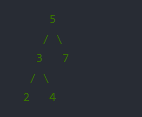二叉搜索树的最近公共祖先
link:235. 二叉搜索树的最近公共祖先 - 力扣(LeetCode)
思路分析
题目给出的是二叉搜索树,那就方便很多.(不用在意遍历顺序)
已知左子树的值都比根节点小,右子树的值都比根节点大(每层都符合该规律)但是由于不知道p、q的值哪个比根节点大所以需要进行比较.
我们在递归的时候只需要不断缩小判断区间即可.
怎么缩小呢?
和p、q的值进行比较即可.
递归
1
2
3
4
5
6
7
8
9
10
11
12
13
14
15
16
17
18
19
20
21
22
23
24
25
26
27
28
29
30
31
32
33
34
35
|
class Solution {
public TreeNode lowestCommonAncestor(TreeNode root, TreeNode p, TreeNode q) {
if(root == null) {
return null;
}
if(root.val > p.val && root.val > q.val) {
TreeNode left = lowestCommonAncestor(root.left,p,q);
if(left != null) {
return left;
}
}
if(root.val < p.val && root.val < q.val) {
TreeNode right = lowestCommonAncestor(root.right,p,q);
if(right != null) {
return right;
}
}
return root;
}
}
|
二叉搜索树中的插入操作
link:701. 二叉搜索树中的插入操作 - 力扣(LeetCode)
思路分析
根据题目描述遍历比较插入即可,和上题一样可以缩小范围进行判断.
题目又说任意地方插入,我们选插入叶子节点,只要遍历当前节点为空就说明扎到了向上返回即可.
递归
1
2
3
4
5
6
7
8
9
10
11
12
13
14
15
16
17
18
19
20
21
22
23
24
25
26
27
28
29
30
|
class Solution {
public TreeNode insertIntoBST(TreeNode root, int val) {
if(root == null) {
TreeNode node = new TreeNode(val);
return node;
}
if(val < root.val) {
root.left = insertIntoBST(root.left,val);
}
if(val > root.val) {
root.right = insertIntoBST(root.right,val);
}
return root;
}
}
|
删除二叉搜索树中的节点
link:450. 删除二叉搜索树中的节点 - 力扣(LeetCode)
思路分析
首先找到要删除的节点(如果是叶子节点的话删除不影响)只要不是叶子节点删除可以把右子树中的最小节点(即右子树的最左侧节点)或左子树中的最大节点(即左子树的最右侧节点)上移占位.
找目标删除的节点也可以用相同的方法缩小判断区间.
六种可能性
1.没有匹配key的节点
2.能找到但匹配值的为叶子节点
3.能找到匹配值不为叶子节点但左子树为空右子树也为空
4.能找到匹配值不为叶子节点但左子树不为空右子树为空
5.能找到匹配值不为叶子节点但左子树为空右子树不为空
6.能找到匹配值不为叶子节点但左子树右子树都不为空
1
2
3
4
5
6
7
8
9
10
11
12
13
14
15
16
17
18
19
20
21
22
23
24
25
26
27
28
29
30
31
32
33
34
35
36
37
38
39
40
41
42
43
| class Solution {
public TreeNode deleteNode(TreeNode root, int key) {
if (root == null) {
return null;
}
if (root.val == key) {
if (root.left == null && root.right == null) {
return null;
}
if (root.left != null && root.right == null) {
return root.left;
}
if (root.left == null && root.right != null) {
return root.right;
}
if (root.left != null && root.right != null) {
TreeNode cur = root.right;
while (cur.left != null) {
cur = cur.left;
}
cur.left = root.left;
return root.right;
}
}
if (root.val < key) {
root.right = deleteNode(root.right, key);
} else {
root.left = deleteNode(root.left, key);
}
return root;
}
}
|
1
2
3
4
5
6
7
8
9
10
11
12
13
14
15
16
17
18
19
20
21
22
23
24
25
26
27
28
29
30
31
32
33
34
35
36
37
38
39
40
41
42
43
44
45
46
47
48
49
50
|
class Solution {
public TreeNode deleteNode(TreeNode root, int key) {
if(root == null) {
return null;
}
if(root.val == key) {
if(root.left == null && root.right == null) {
return null;
}else if(root.left != null && root.right == null) {
return root.left;
}else if(root.left == null && root.right != null) {
return root.right;
}else {
TreeNode cur = root.left;
while(cur.right != null) {
cur = cur.right;
}
cur.right = root.right;
root = root.left;
return root;
}
}
if(root.val < key) {
root.right = deleteNode(root.right,key);
}
if( key < root.val) {
root.left = deleteNode(root.left,key);
}
return root;
}
}
|
Tips
为什么是cur.left = root.left;?
假设我们有如下结构的树.

1
2
3
4
5
| TreeNode cur = root.right;
while (cur.left != null) {
cur = cur.left;
}
cur.left = root.left;
|

